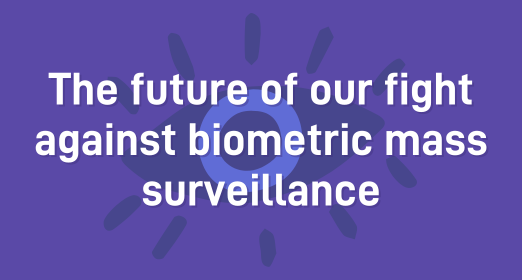BMS
Filter by...
-

How to fight Biometric Mass Surveillance after the AI Act: A legal and practical guide
The EU's Artificial Intelligence Act has been adopted, laying out an in-principle ban on live mass facial recognition and other public biometric surveillance by police. Yet the wide exceptions to this ban may pave the way to legitimise the use of these systems. This living guide, for civil society organisations, communities and activists, charts a human rights-based approach for how to keep resisting biometric mass surveillance practices now and in the future
Read more
-

The future of our fight against biometric mass surveillance
The final AI Act is disappointingly full of holes when it comes to bans on different forms of biometric mass surveillance (BMS). Despite this, there are some silver linings in the form of opportunities to oppose BMS in public spaces and to push for better protection of people’s sensitive biometric data.
Read more
-

EU AI Act: Deal reached, but too soon to celebrate
On 8 December 2023, following over 36 hours of negotiations, EU lawmakers finally cinched a deal on the Artificial Intelligence Act. However, whilst some fundamental rights protections have been won, the overall Act has not lived up to its potential to put people and their rights front and center.
Read more
-

How EU’s plan to digitising travel documents might affect you
The EU Commission wants to store ID data on smartphones in the future and introduce contactless border controls with biometrics. This could affect all travelers in the future. EDRi member Digitalcourage submitted feedback to this EU initiative to intervene.
Read more
-

EU Parliament calls for ban of public facial recognition, but leaves human rights gaps in final position on AI Act
The final EU Parliament position upholds all of the fundamental rights demands which were added at committee level. Despite efforts to overturn it, the final position also maintains the committees' strong stance against biometric mass surveillance practices. But it is disappointing that the plenary missed the opportunity to increase protections when it comes to empowering people affected by the use of AI and the rights of migrants, refugees and asylum seekers.
Read more
-

EU Parliament sends a global message to protect human rights from AI
Today, the Internal Market Committee (IMCO) and the Civil Liberties Committee (LIBE) committees took several important steps to make this landmark legislation more people-focused by banning AI systems used for biometric surveillance, emotion recognition and predictive policing. Disappointingly, the MEPs stopped short of protecting the rights of migrants.
Read more
-

2021: Looking back at digital rights in the year of resilience
We started 2021, hoping to leave the tremendously challenging year of 2020 behind. The Covid-19 pandemic has had a devastating impact on our societies, causing unprecedented harm to people and economies. If 2020 was the year of the pandemic shock, 2021 was the year of resilience. We had to learn to live in a constant uncertainty of what it would take to keep defending human rights: Could we work and walk down the streets without being constantly surveilled? Would efforts to tackle disinformation distort legitimate content, or would they bring down Big Tech instead? Will 2022 be 2021 2.0?
Read more
